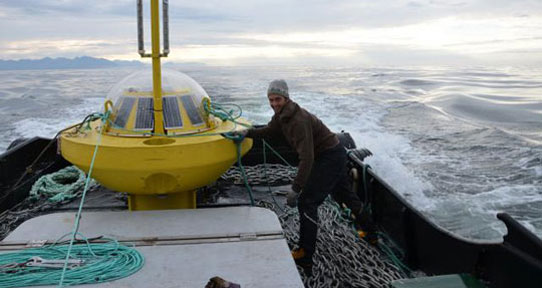Mission

Wave energy converters (WECs) are often cited as an important entry in the array of renewable energy technologies that are to diversify Canada’s energy generation portfolio. Even at extremely conservative estimates of the Vancouver Island wave power transport (~10MW/km), the coastline of Vancouver Island has an incident wave energy flux that eclipses the capacity of BC Hydro’s proposed Site C hydro-electric station.
However, while the magnitude of the raw wave energy resource is widely acknowledged, little is currently available detailing the spatial and temporal variation of incident wave energy, the performance characteristics on WEC within our wave climate and how this renewable energy may be optimized to integrate successfully within the local, provincial and national electricity grid. Without detailed research into these fields, providing a description of how the national wave energy opportunity can be realized, the promise of wave energy rings hollow with Canadian communities, power project developers, and utilities who must participate in a Canadian WEC industry. For these stakeholders to initiate transformational change in energy generation policy and practice, the long term global potential of wave energy has to be complemented with a locally relevant, short term vision that is built on a precise description of:
- the Canadian wave energy resource – as represented by a region of strategic importance,
- the expected performance of full scale commercial WECs when deployed in that region, and
- the best techno-economic strategy for the integration of the WEC supplied power at off-grid and grid connected community scales.
The WCWI team is entirely focused on facilitating the long term ambitions of the Technology Roadmap creating a shared understanding of the usable extent of the WCVI wave energy resource to all ocean stakeholders. The WCWI will provide a sorely needed four year database of physical measurements and numerical model results describing the WCVI wave energy resource. For the WEC developer partners, the project will produce the first data set describing the performance of WECs off of Vancouver Island and how these performances need be accommodated on-shore with energy storage technologies. By providing this preview of the WEC industry with no environmental impact, the WCWI team will be able to engage outside groups, with interests that compete with ocean energy, in a constructive manner.
Additionally, we aim to create the social and technological climates that attract WEC innovators. Wave energy converters (WECs) are an early stage transformative technology, and while independent technology developers are excellent in the mechanical design and innovation of their technologies, it is impractical for them to conduct comprehensive resource assessment and market development simultaneous with their core expertise. By offloading these responsibilities and executing them now, the WCWI leadership group will allow technology developers to focus on accelerating Canadian based innovation in wave energy conversion
Finally, we will strive to create a knowledge base for the creation of beneficial public policy. The computer modeling of the WCWI will determine the short and intermediate term benefits that WEC supplied power provides the nation through the use of the WCVI resource: e.g. “How much power can be converted?” and “What undesirable forms of energy generation can it displace?”.
